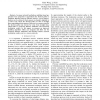138 search results - page 13 / 28 » Coverage-Aware Sensor Engagement in Dense Sensor Networks |
129
click to vote
IJSNET
2006
15 years 1 months ago
2006
: To extend the functional lifetime of battery-operated Wireless Sensor Networks (WSNs), stringent sleep scheduling strategies with communication duty cycles running at sub-1% rang...
112
click to vote
IPSN
2004
Springer
15 years 7 months ago
2004
Springer
The performance of a sensor network may be best judged by the quality of application specific information return. The actual sensing performance of a deployed sensor network depe...
125
click to vote
REALWSN
2010
14 years 8 months ago
2010
Abstract. Environmental scientists frequently engage in "campaignstyle" deployments, where they visit a location for a relatively short period of time (several weeks to m...
123
click to vote
INFOCOM
2006
IEEE
15 years 7 months ago
2006
IEEE
Abstract— In sensor network localization, multihop based approaches were proposed to approximate the shortest paths to Euclidean distances between pairwise sensors. A good approx...
143
click to vote
WINET
2011
14 years 8 months ago
2011
Sleep scheduling, which is putting some sensor nodes into sleep mode without harming network functionality, is a common method to reduce energy consumption in dense wireless sensor...

